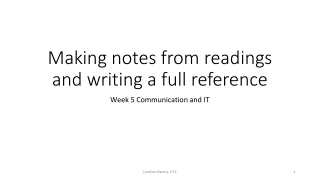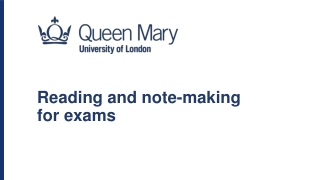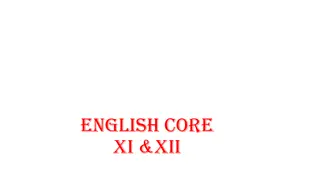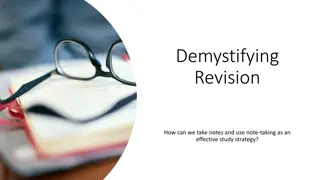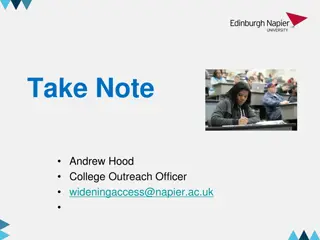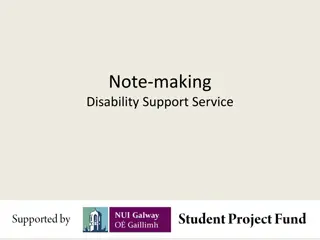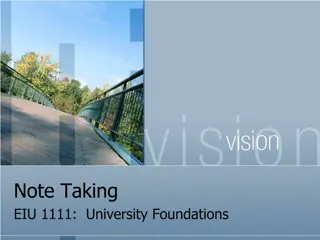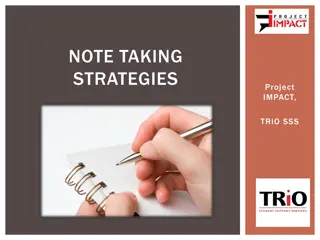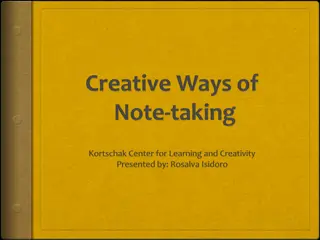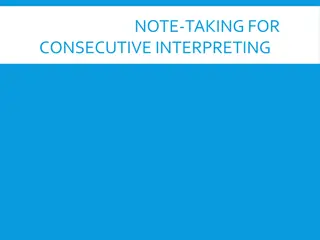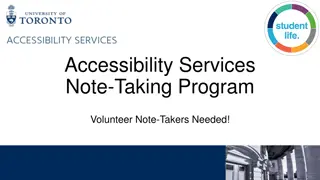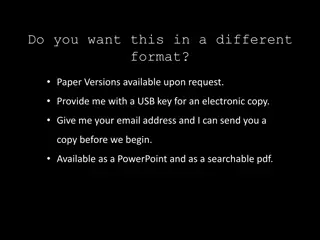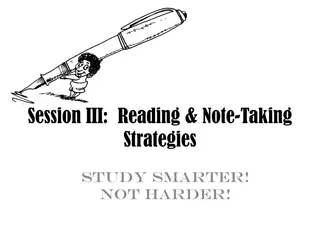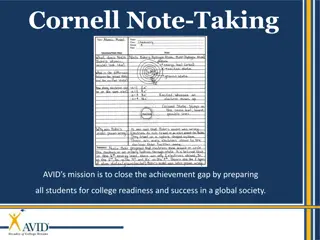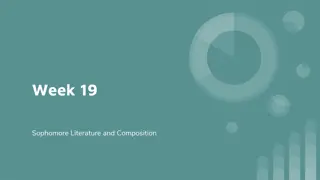
Understanding Logic in Legal Research
Explore the concept of logic in legal research, including building arguments, dissecting opponents' arguments, and identifying fallacies. Learn to think critically and analyze situations for logical errors, enhancing your ability to create innovative solutions.
Download Presentation

Please find below an Image/Link to download the presentation.
The content on the website is provided AS IS for your information and personal use only. It may not be sold, licensed, or shared on other websites without obtaining consent from the author. If you encounter any issues during the download, it is possible that the publisher has removed the file from their server.
You are allowed to download the files provided on this website for personal or commercial use, subject to the condition that they are used lawfully. All files are the property of their respective owners.
The content on the website is provided AS IS for your information and personal use only. It may not be sold, licensed, or shared on other websites without obtaining consent from the author.
E N D
Presentation Transcript
Module 3: The Basics of Legal Research LAW1231: Lecture 13 Let s Get Technical Part 2
Introduction In this lecture, we focus on logic. Logic helps you to build your arguments, and also to dissect your opponents arguments. Both types of thinking are important: the building up and the breaking down. The goal is also to teach you how to think critically. This will assist you in creating new solutions, sometimes by synthesizing information from many different places.
Learning Objectives By the end of the lecture, you will be able to: Examine the concept of logic Identify fallacies in making logical deductions Analyze situations to identify logical errors
Examining Logic "Logic is the beginning of wisdom ... not the end." Spock I find your arguments strewn with gaping defects in logic Spock Logic!" said the Professor half to himself. "Why don't they teach logic at these schools? There are only three possibilities. Either your sister is telling lies, or she is mad, or she is telling the truth. You know she doesn't tell lies and it is obvious that she is not mad. For the moment then and unless any further evidence turns up, we must assume that she is telling the truth. The Lion, the Witch and the Wardrobe 25/08/2025 01:19
What is logic? Logic is a formal system of analysis for proving arguments. For something to be logical, the conclusion must be based on the arguments. For example, here is a famous example from Aristotle: Premise 1: All men are mortal Premise 2: Socrates is a man Conclusion: Therefore, Socrates is mortal. The second skill involves evaluating the arguments. Do they lead to a true conclusion? 25/08/2025 01:19
What are Arguments? Arguments vs. Statements An argument is a conclusion based on one or more premises (explanations). Either the conclusion or the premise can be stated first. A statement, also called a claim, is a sentence which can be true or false. Which of the following sentences are statements? Which are arguments? 1. Meet me in St. Louis 2. It s a lie I didn t have to tell because we both know where I m about to go and we know it very well 3. You re beautiful, so beautiful, it s true 4. If you like it then you shoulda put a ring on it 5. I can have another you in a minute so don t you ever get to thinking you re irreplaceable 25/08/2025 01:19
What are Arguments? It can be helpful to break sentences / paragraphs into their component parts to see whether they are arguments. Initial Sentences/Paragraphs 1. Meet me in St. Louis 2. We both know where I m about to go and we know it very well 3. So it s a lie I didn t have to tell 4. You re beautiful, so beautiful, it s true 5. If you like it then you shoulda put a ring on it 6. I can have another you in a minute 7. So don t you ever get to thinking you re irreplaceable
What are Arguments? Let us break the sentences / paragraphs from the previous slide into their component parts to see whether they are arguments. 1. Meet me in St. Louis (not a statement) 2. We both know where I m about to go and we know it very well (premise) 3. So it s a lie I didn t have to tell (statement) 4. You re beautiful, so beautiful, it s true (statement but no premise) 5. If you like it then you shoulda put a ring on it (not a statement) 6. I can have another you in a minute (statement / premise) 7. So don t you ever get to thinking you re irreplaceable (not a statement or premise)
Types of Arguments Sometimes the premises will be about WHETHER the statement is true. Other times the premises will be about WHY the statement is true. This is called an explanation . Compare: A: We know that obesity is on the rise in the U.S. because multiple studies carried out by the CDC and NIH have consistently shown a rise in obesity over the last four decades. B: The reason that the rate of obesity is on the rise in the U.S. is that the foods we most often consume over the past four decades have increasingly contained high levels of sugar and low levels of dietary fibre. Since eating foods high in sugar and low in fibre triggers the insulin system to start storing those calories as fat, it follows that people who consume foods high in sugar and low in fibre will tend to store more of the calories consumed as fat.
Types of Arguments Argument A 1. Multiple studies by the CDC and NIH have consistently shown a rise in obesity over the last four decades. 2. Therefore, obesity is on the rise in the U.S. Argument B 1. Over the past four decades, Americans have increasingly consumed foods high in sugar and low in fibre. 2. Consuming foods high in sugar and low in fat triggers the insulin system to start storing those calories as fat. 3. When people store more calories as fat, they tend to become obese. 4. Therefore, the rate of obesity is on the rise in the U.S.
Problems in Making Logical Deductions Sometimes an argument might not be logical. This might happen when a premise is vague. For example: Premise 1: Some politicians are corrupt Premise 2: Mr. X is a politician Conclusion: Therefore Mr. X is corrupt 25/08/2025 01:19
Problems in Making Logical Deductions Other times, the argument might be logical but not true. This could happen if a premise is false. For example: Premise 1: UWI course directors can fly Premise 2: NPR is a UWI course director Conclusion: Therefore NPR can fly 25/08/2025 01:19
Problems in Making Logical Deductions A major problem arises when information is missing. This is a common problem in law essays the conclusion is based on premises which have not been stated. For example: Premise 1: Dr. X had a duty of care to Patient Y Premise 2: Dr. X performed the surgery negligently Conclusion: The hospital is liable. The steps have been left out showing how we got from point A to point B. Remember to always build your argument carefully. Photo from https://www.turbosquid.com/3d-models/3d-model-falling-house-cards/1126564 25/08/2025 01:19
Logical Fallacies to be Avoided Let us spend a little time on logical fallacies. These are things you want to avoid in your arguments. You want your arguments to be persuasive, and while in real life you might be able to inject values or emotion, these are not appropriate in a legal context, (i.e. in your law school essays). In law school, your essays should always be based on principle, precedent and policy, even the ones that ask for your opinion . 25/08/2025 01:19
Logical Fallacies to be Avoided Logical fallacies are common errors in reasoning. Look out for the following: 1. Ad hominem: attacking a person s character rather than his or her arguments e.g.. Ms. X is a young lawyer who does not properly understand the rules of property law. [Actual words spoken about me by another lawyer in court who had obviously run out of arguments on behalf of her client.] 2. Generalization: All female judges are biased against men. 3. Confusing correlation with causation: As the cost of living has increased, students have performed better in their French exams. 25/08/2025 01:19
Useful Resource Links (Not Mandatory) Here are two free textbooks on logic. They contain interesting examples. Bradley Dowden, Logical Reasoning (Dowden 2019) <https://www.csus.edu/indiv/d/dowdenb/4/Logical-Reasoning.pdf> Matthew Van Cleave, Introduction to Logic and Critical Thinking (Open Textbook Library 2016) <https://open.umn.edu/opentextbooks/textbooks/introduction-to- logic-and-critical-thinking>
Learning Activity 13.1 13.1 Learning Activity Ungraded Instructions: Identify some of the logical errors in the following extract from an essay on the Myrie case. Post your answers to an appropriate discussion forum on your online Learning Management System and comment on the postings of at least 2 of your peers. Myrie Case The decision in the case has far reaching consequences because smaller member states might find it difficult to allow free movement since some of the immigrants might compete with the locals. On the other hand, while it may seem to be another scenario of brain drain, the regional labour market in the longer run is improved. The decision was not too perplexing so the common man should understand it as it was done with common sense. However, there are some deficiencies in the reasoning and one can question whether the decision was biased given that there were no Barbadian judges on the panel.
Learning Activity 13. 2 13.2 Learning Activity Ungraded Instructions: Evaluate the following arguments. Are they logical? Are the conclusions true? Post your responses to an appropriate discussion forum on your online Learning Management System and comment on the postings of at least 2 of your peers. 1. I should not be fired from my job as Governor of the Central Bank because the Barbados economy is depending on me. 2. McDonald s is liable for disrupting my family life and causing me to spend money I would not normally spend because my 6- year-old daughter pesters me for Happy Meals and I sometimes give in to her just for the sake of peace and harmony
Learning Activity 13.3 Tutorial Session 13.3 Learning Activity Ungraded Tutorial 7 : We continue the debate first described in Tutorial 5. Please see the tutorial 5-7 file which was provided at lectures 9-10 to prepare for your tutorial.
Learning Activity 13.4 13.4 Learning Activity Ungraded Writing Exercise 6 with self-assessment Instructions: Expand your outline from Exercise 5b into an essay. Use the same rubric. Post your essay and completed rubric to an appropriate discussion forum on your Learning Management System.
Summary Logic and critical thinking form the heart of law. Yet they are sometimes presented in a way that tends to obfuscate rather than enlighten. Today we looked at a simple framework for breaking down, building up and evaluating arguments. Up next: defences and multiple issues.

